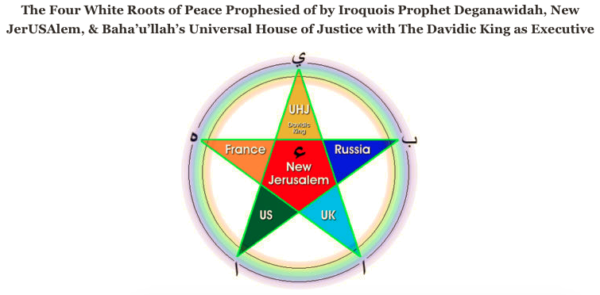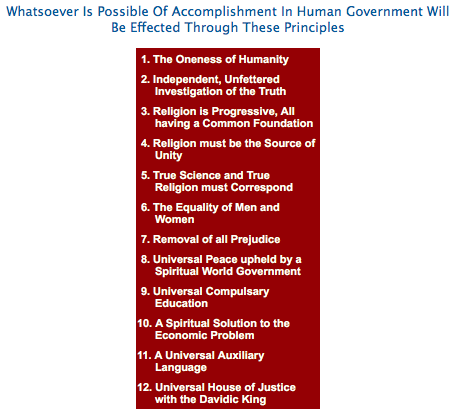*****
This treatise was written in reply to a seeker who had asked how the promised Mihdí could have become transformed into ‘Alí-Muḥammad (the Báb). The opportunity provided by this question was seized to elaborate on a number of subjects, all of which are of use and benefit both to them that seek and to those who have attained, could ye perceive with the eye of divine virtue.
Baha’u’llah, Preface to Gems of Divine Mysteries
*****
I heard, with Mine own ears, one of their divines proclaim: “Should all these signs come to pass and the long-awaited Qá’im appear, and should He ordain, with respect to even our secondary laws, aught beyond that which hath been revealed in the Qur’án, we would assuredly charge Him with imposture, put Him to death, and refuse forever to acknowledge Him”, and other statements such as these deniers make. And all this, when the Day of Resurrection hath been ushered in, and the Trumpet hath been sounded, and all the denizens of earth and heaven have been gathered together, and the Balance hath been appointed, and the Bridge hath been laid, and the Verses have been sent down, and the Sun hath shone forth, and the stars have been blotted out, and the souls have been raised to life, and the breath of the Spirit hath blown, and the angels have been arrayed in ranks, and Paradise hath been brought nigh, and Hell made to blaze! These things have all come to pass, and yet to this day not a single one of these people hath recognized them! They all lie as dead within their own shrouds, save those who have believed and repaired unto God, who rejoice in this day in His celestial paradise, and who tread the path of His good-pleasure.
Veiled as they remain within their own selves, the generality of the people have failed to perceive the sweet accents of holiness, inhale the fragrance of mercy, or seek guidance, as bidden by God, from those who are the custodians of the Scriptures. He proclaimeth, and His word, verily, is the truth: “Ask ye, therefore, of them that have the custody of the Scriptures, if ye know it not.” Nay rather, they have turned aside from them and followed instead the Sámirí of their own idle fancies. Thus have they strayed far from the mercy of their Lord and failed to attain unto His Beauty in the day of His presence. For no sooner had He come unto them with a sign and a testimony from God than the same people who had eagerly awaited the day of His Revelation, who had called upon Him in the daytime and in the night season, who had implored Him to gather them together in His presence and to grant that they may lay down their lives in His path, be led aright by His guidance and illumined by His light—this very people condemned and reviled Him, and inflicted upon Him such cruelties as transcend both My capacity to tell and thine ability to hear them. My very pen crieth out at this moment and the ink weepeth sore and groaneth. By God! Wert thou to hearken with thine inner ear, thou wouldst in truth hear the lamentations of the denizens of heaven; and wert thou to remove the veil from before thine eyes, thou wouldst behold the Maids of Heaven overcome and the holy souls overwhelmed, beating upon their faces and fallen upon the dust.
Alas, alas, for that which befell Him Who was the Manifestation of the Self of God, and for that which He and His loved ones were made to suffer! The people inflicted upon them what no soul hath ever inflicted upon another, and what no infidel hath wrought against a believer or suffered at his hand. Alas, alas! That immortal Being sat upon the darksome dust, the Holy Spirit lamented in the retreats of glory, the pillars of the Throne crumbled in the exalted dominion, the joy of the world was changed into sorrow in the crimson land, and the voice of the Nightingale was silenced in the golden realm. Woe betide them for what their hands have wrought and for what they have committed!
*****
But as to Him Who appeared in the year sixty, He standeth in need of neither transformation nor interpretation, for His name was Muḥammad, and He was a descendent of the Imáms of the Faith. Thus it can be truly said of Him that He was the son of Ḥasan, as is undoubtedly clear and evident unto thine eminence. Nay, He it is Who fashioned that name and created it for Himself, were ye to observe with the eye of God.
Baha’u’llah, Gems of Divine Mysteries (excerpts)
*****
It would indeed be no exaggeration to say that nowhere in the whole compass of the world’s religious literature, except in the Gospels, do we find any record relating to the death of any of the religion-founders of the past comparable to the martyrdom suffered by the Prophet of Shíráz. So strange, so inexplicable a phenomenon, attested by eye-witnesses, corroborated by men of recognized standing, and acknowledged by government as well as unofficial historians among the people who had sworn undying hostility to the Bábí Faith, may be truly regarded as the most marvelous manifestation of the unique potentialities with which a Dispensation promised by all the Dispensations of the past had been endowed. The passion of Jesus Christ, and indeed His whole public ministry, alone offer a parallel to the Mission and death of the Báb, a parallel which no student of comparative religion can fail to perceive or ignore. In the youthfulness and meekness of the Inaugurator of the Bábí Dispensation; in the extreme brevity and turbulence of His public ministry; in the dramatic swiftness with which that ministry moved towards its climax; in the apostolic order which He instituted, and the primacy which He conferred on one of its members; in the boldness of His challenge to the time-honored conventions, rites and laws which had been woven into the fabric of the religion He Himself had been born into; in the rôle which an officially recognized and firmly entrenched religious hierarchy played as chief instigator of the outrages which He was made to suffer; in the indignities heaped upon Him; in the suddenness of His arrest; in the interrogation to which He was subjected; in the derision poured, and the scourging inflicted, upon Him; in the public affront He sustained; and, finally, in His ignominious suspension before the gaze of a hostile multitude—in all these we cannot fail to discern a remarkable similarity to the distinguishing features of the career of Jesus Christ.
Shoghi Effendi, God Passes By, pp. 56-57
*****

